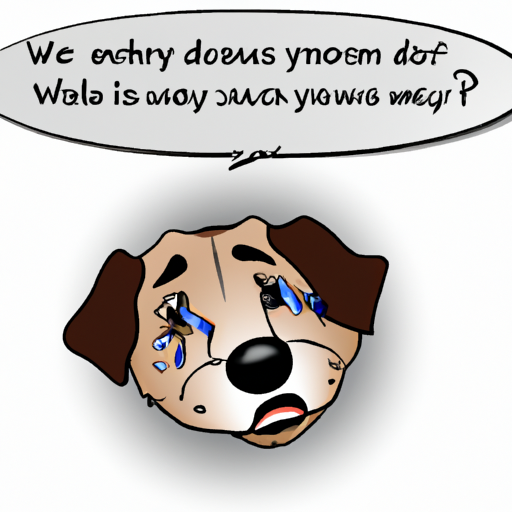Understanding Your Dog’s Emotions
Just like us, dogs also have a wide range of emotions. They can feel happy, sad, anxious, and even stressed. But one thing that might concern you as a caregiver is when you see your dog shedding tears. It’s essential to understand that dogs express their emotions differently than humans. They primarily use body language, vocalizations, and behavior to communicate their feelings. Tears in dogs can be a sign of several things, but it is not typically associated with emotional crying as it is in humans.
When Dogs Cry: Is It Really About Emotion?
When you see your dog’s eyes watering, it’s natural for you to think that they’re in emotional distress. However, it’s important to note that dogs don’t cry tears in response to emotions as humans do. Dogs have tear ducts and produce tears, but these are primarily for lubricating the eyes and flushing out irritants. If your dog’s eyes are constantly watering, it could be a sign of a health issue that needs attention.
Common Causes of Tears in Dogs
There are several reasons why your dog might be producing tears. These include:
- Allergies: Just like humans, dogs can also have allergies. These can cause their eyes to water.
- Irritants: Dust, smoke, and other irritants can get into your dog’s eyes, causing them to produce tears to flush out the irritant.
- Eye Infections: Dogs can get eye infections, which can cause excessive tearing.
- Blockage of Tear Ducts: If your dog’s tear ducts are blocked, they might produce excessive tears.
Here’s a table to help you understand the possible causes and their corresponding symptoms:
| Causes | Symptoms |
|---|---|
| Allergies | Itching, redness, swelling |
| Irritants | Redness, blinking, pawing at the eye |
| Eye Infections | Discharge, redness, swelling |
| Blocked Tear Ducts | Constant tearing, discharge |
How Can You Help Your Dog?
As a caregiver, you play a crucial role in your dog’s wellbeing. If your dog is tearing up, it’s important to find the cause and address it. Here’s what you can do:
- Monitor Your Dog’s Behavior: Keep an eye on your dog’s behavior. Are they behaving differently? Are they pawing at their eyes or seem uncomfortable? These could be signs of distress.
- Check Your Dog’s Eyes: Look for signs of redness, swelling, or discharge.
- Take Your Dog to the Vet: If your dog’s eyes are constantly watering, it’s best to take them to the vet. They can diagnose the issue and provide appropriate treatment.
Frequently Asked Questions
Q: Do dogs cry tears when they are sad?
A: Dogs do not cry tears in response to emotional distress like humans do. If your dog’s eyes are watering, it could be due to various reasons, including allergies, irritants, or health issues.
Q: How can I tell if my dog is in pain?
A: Dogs primarily express pain through changes in their behavior. They may become less active, show changes in eating habits, or exhibit signs of discomfort.
Q: What should I do if my dog’s eyes are constantly watering?
A: If your dog’s eyes are constantly watering, it’s best to take them to the vet. A vet can diagnose the issue and provide appropriate treatment.



